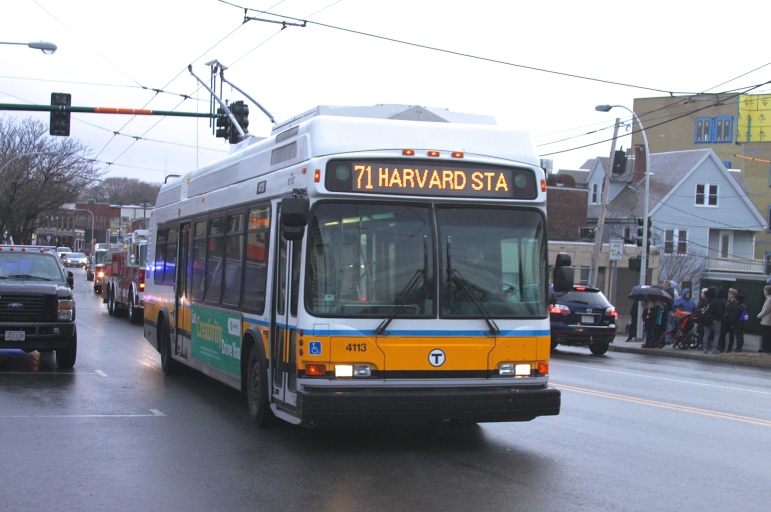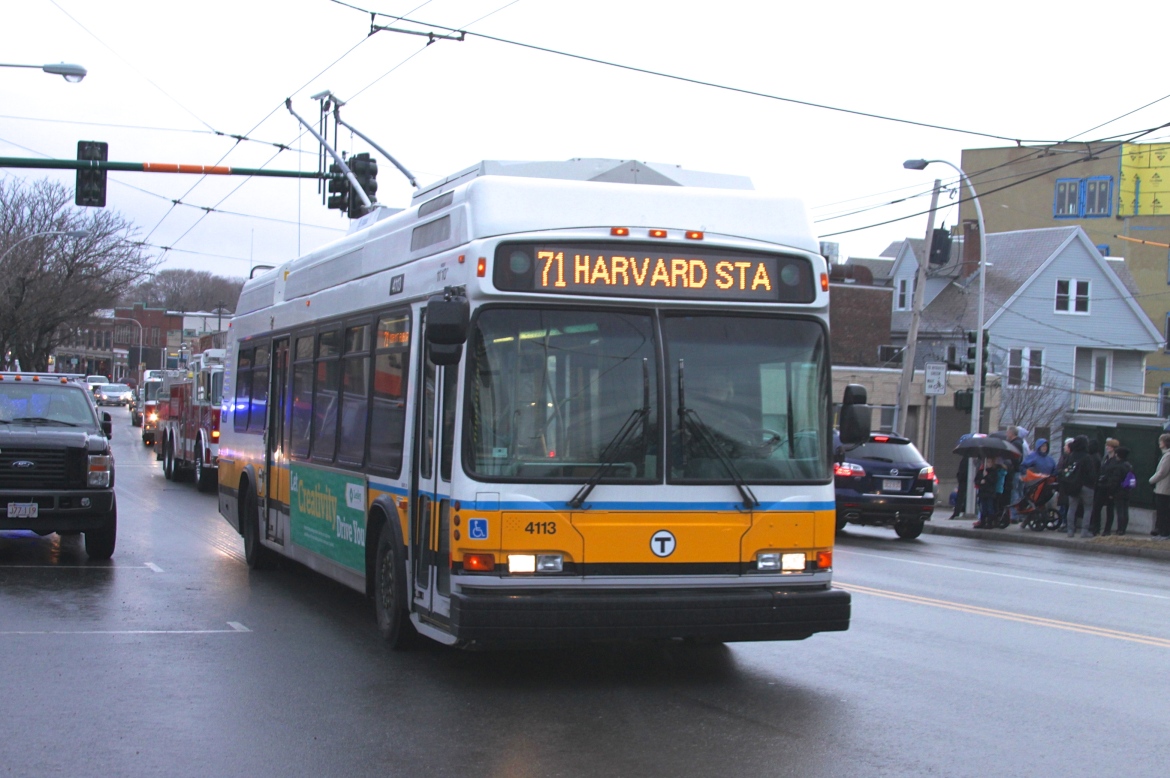
Charlie Breitrose
An MBTA bus in Watertown.
Watertown officials announced Wednesday that the Bar Foundation, as part of its BostonBRT initiative, has awarded the community a grant to conduct a pilot project testing bus rapid transit (BRT) features in collaboration with the City of Cambridge and the MBTA. The pilot will seek to create a faster and more reliable commute for more than 12,000 daily bus riders on routes 71 and 73.
The pilot, which will take place during 2018, will take bus riders out of car congestion through the creation of all-day dedicated bus lanes for significant segments on Mount Auburn Street between Belmont Street and Fresh Pond Parkway. It will also include inbound “queue jump” lanes to give buses
priority in intersections on Mount Auburn Street and Belmont Street near where they meet, and timed traffic signals where feasible so that buses get more green lights.
The pilot is a temporary demonstration. Cambridge, Watertown, and the MBTA will then work with community members to evaluate the pilot and determine if any of the elements should be permanently implemented or explored further.
“The Town of Watertown is excited to partner with the MBTA and City of Cambridge on this important project, and thanks the Barr Foundation for their generous support,” said Matthew Shuman, Town Engineer for the Town of Watertown. “As we redesign Mount Auburn Street and Watertown Square using a Complete Streets approach, we must remember that around 5,000 bus trips are made each day in Watertown using the corridor. The Route 71 bus is an important asset for the community. Likewise, improving service and reliability is an important goal for the Town. We look forward to implementing short and long-term improvements with our partners.”
“These pilot projects will show BRT’s potential to transform how people in Greater Boston get to where they need to go, and how BRT can fit within the region’s transportation system,” said Mary Skelton Roberts, co-director for climate at the Barr Foundation. “For BRT to be successful, local and state governments, communities, and transit experts need to work together. These winning proposals demonstrated their readiness to do so. And we hope their commitment to collaboration during this pilot testing periods is just the beginning. Massachusetts residents deserve flexible, environmentally-sustainable transportation options they can count on, like BRT.”
The grant in Watertown was one of three awarded as part of a competitive request for proposals from BostonBRT, which invited municipalities to partner with the MBTA to demonstrate the potential of BRT in high-ridership, high-traffic areas, with the goal of improving the transit experience for the most people.
The Watertown-Cambridge project was selected along with projects in Arlington and Everett. All pilot grants were selected by a committee comprised of Massachusetts transportation leaders convened by the Barr Foundation and BostonBRT technical consultants that reviewed criteria such as the number of BRT elements included within proposals, proof of concept, potential impact (including density of population and employment), municipal and community support, and willingness to partner with state agencies to create a successful pilot.
About BRT
BRT systems are highly efficient, cost-effective transit delivered via dedicated, bus-only lanes aligned in the middle of street corridors, where riders pre-pay fares and board buses on level platforms. Gold Standard is the highest standard of BRT, as defined by the global BRT Standard, and features the very best in international practices, including features such as a dedicated right-of- way, off-board fare
collection, platform-level boarding, real-time passenger information, a high frequency of service, and full BRT infrastructure through high traffic demand sections of a city or region.About
BostonBRT
BostonBRT is a research and community engagement initiative spearheaded by the Barr Foundation to explore the potential of Gold Standard BRT for Greater Boston’s mobility needs. Begun with a research phase, Boston BRT released a report in 2015 identifying five corridors where Gold Standard BRT is technically feasible and where there is already sufficient rider demand. BostonBRT is now coordinating with municipalities, community groups, and neighborhood leaders to educate about the benefits and trade-offs of Gold Standard BRT, and the opportunities to incorporate Gold Standard BRT in their transportation planning efforts. BostonBRT can be found online at www.bostonBRT.org and @bosBRT
on Twitter.
About the Barr Foundation
Based in Boston, the Barr Foundation focuses regionally, and selectively engages nationally, working in partnership with nonprofits, foundations, the public sector, and civic and business leaders to elevate the arts and creative expression, to advance solutions for climate change, and to connect all students to success in high school and beyond. The Foundation’s Mobility grant making aims to reduce
transportation-related emissions by transforming how people get around and how we build our communities in Massachusetts. With assets of $1.7 billion, Barr is among the largest private foundations in New England and has contributed more than $834 million to charitable causes since 1999. Learn more at www.barrfoundation.org, and on Facebook and Twitter.
